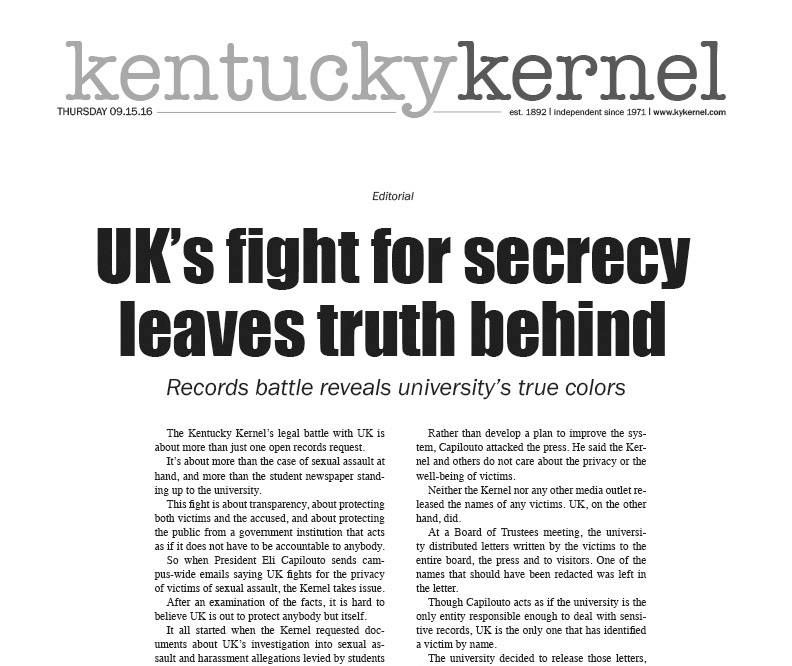UK’s fight for secrecy leaves truth behind
September 15, 2016
The Kentucky Kernel’s legal battle with UK is about more than just one open records request.
It’s about more than the case of sexual assault at hand, and more than the student newspaper standing up to the university.
So when President Eli Capilouto sends campus-wide emails saying UK fights for the privacy of victims of sexual assault, the Kernel takes issue.
After an examination of the facts, it is hard to believe UK is out to protect anybody but itself.
It all started when the Kernel requested documents about UK’s investigation into sexual assault and harassment allegations levied by students against associate professor James Harwood.
UK refused to release most of those records. The records it did release glossed over allegations against Harwood, and did not say that two people filed formal complaints in the case.
The complete documents — which an anonymous source related to the case gave to the Kernel after UK refused — revealed that two students filed formal complaints, and that several others had similar accounts regarding Harwood.
The stark contrast between what UK released and what actually happened shows that UK cannot be trusted to be transparent about how it deals with sexual assault on campus.
Related: UK shows contempt, disrespect for attorney general, retired official says
UK’s practices would have never come under public scrutiny if it was not for the spokesperson for the victims who told the Kernel about the investigation.
They showed that at UK, people who have been charged with violations hold too much power. The university gives the accused privacy in matters the public has a right to know.
Faculty accused of sexual assault can decide to settle with the university, resign, and move on to other universities without having to complete the formal disciplinary process.
UK assures them privacy which allows faculty accused of crimes to move from university to university. It is a system built for the accused, not for the victims.
Yet Capilouto claims the university hides records to protect student privacy.
Make no mistake, government officials have long used this backward argument to protect their own interests.
When several members of the Board of Trustees, the Faculty Senate and the Kernel pointed out flaws in UK’s sexual assault policies, Capilouto asked faculty to help prevent sexual abusers from landing jobs elsewhere.
But Capilouto has taken no concrete action to fix the problems inherent in UK’s sexual assault policies.
Rather than develop a plan to improve the system, Capilouto attacked the press. He said the Kernel and others do not care about the privacy or the well-being of victims.
Neither the Kernel nor any other media outlet released the names of any victims. UK, on the other hand, did.
At a Board of Trustees meeting, the university distributed letters written by the victims to the entire board, the press and to visitors. One of the names that should have been redacted was left in the letter.
Though Capilouto acts as if the university is the only entity responsible enough to deal with sensitive records, UK is the only one that has identified a victim by name.
Related: UK’s suit for secrecy betrays public interest
The university decided to release those letters, but it will not allow similar documents with sensitive information to go through the proper legal proceedings and redaction process.
It is not the university’s place to decide what documents should be released to the public. This is the job of the legal system, not the university president.
Capilouto spoke at the board meeting and the Faculty Senate with a careless disregard for the truth.
He said the Kernel printed “salacious” details about the accusations of sexual assault to gain readership.
Nothing about these alleged assaults is salacious. To call details of sexual assault salacious only further stigmatizes victims.
The students who came forward through a spokesperson to the Kernel should be praised for their bravery, not led to believe they should feel ashamed for what happened. Capilouto never made any attempt to verify his false accusations against the Kernel.
Capilouto’s choice of words shows that UK sees the Harwood case as a problem for public relations, not as an example of institutional flaws that need to be fixed.
And UK shows no signs of backing down. UK refused to release the documents to the attorney general, the state’s chief law enforcement officer tasked with determining whether disputed records should be released.
Capilouto acts as if UK is above the law and above all public oversight.
Several UK trustees were right when they said the university’s actions in this case make UK look like a backwater institution, put faculty in a tough position and show serious problems in university policy.
The reputation of the university has suffered because of these unsound legal arguments and UK’s refusal to be transparent.
It is now clear that the university is fighting for secrecy, not for privacy. It is fighting for itself, not for victims.
Email opinions@kykernel.com




























































































































































